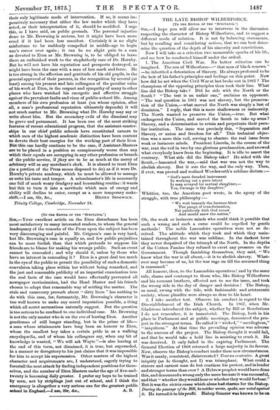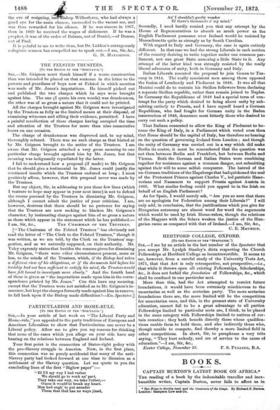THE LATE BISHOP WILBERFORCE. [To THE EDITOR or rmi "SPECTATOR"]
Sin,—I hope you will allow me to intervene in the discussion respecting the character of Bishop Wilberforce, and to suggest a different mode of solution. It is not by balancing statements, but by recalling and considering actions, that we can beat deter- mine the question of the depth of his sincerity and convictions.
Now I will take as a criterion two memorable epochs of his life, and see how he conducted himself under the ordeaL 1. The American Civil War. No better criterion can be imagined. The son of Wilberforce—" that man of black renown " —he inherited a detestation of Slavery. He always professed to be the heir of his father's principles and feelings on this point. Now how did he act when the Civil War at last broke out in 1861 ? The champions of the opposing principles then took their line. What line did the Bishop take ? Did he side with the North or the South ? "The test is an unfair one," exclaims an opponent " The real question in 1861 was not slavery, but the preserva- tion of the Union,—what moved the North was simply a lust of dominion." I reply, that this is mere shallowness or insincerity. The North wanted to preserve the Union,—true. But what endangered the Union, and moved the South to take up arms? Slavery, and a determination to retain and perpetuate their pecu- liar institution. The issue was precisely this, "Separation and Slavery, or union and freedom for all." This technical objec- tion was a mere thin veil, serving to obscure the real issue from weak or insincere minds. President Lincoln, in the course of the war, rent the veil in two by one glorious proclamation, and avowed what everybody knew from the beginning. It is idle to assert the contrary. What side did the Bishop take? He sided with the South,—lamented the war,—said that war was not the way to abolish slavery. But it was the way, and the only way. Then, if ever, was proved and realised Wordsworth's sublime dictum :—
"God's most dreaded instrument In working out a pure intent Is man arrayed for mutual slaughter,—
Yea, Carnage is thy daughter."
Whittier, too, the American poet wrote, in the agony of the struggle, with true philosophy :—
" We wait beneath the furnace-blast
The pangs of transformation, Not painlessly doth God recast And mould anew the nation."
Oh, the weak or insincere minds who could think it possible that such a wrong and such a curse could be expelled by gentle methods ! The noble Lancashire operatives were not so de- ceived. The attitude which they took and which they main- tained throughout the war was sublime. In the darkest hour they never despaired of the triumph of the North, In the depths of the Cotton Famine they refused to exert any pressure on the Government. Though famishing themselves, they said, " We know what the war is all about,—it is to abolish slavery. What- ever may become of us, let the war rage on till the accursed thing is consumed."
All honour, then, to the Lancashire operatives! and by the same rule, shame and contempt to those who, like Bishop Wilberforce and his recreant brothers, affected not to see the issue, and took the wrong side in the day of danger and decision ! The Bishop, as usual, swung with the tide, with fashionable and aristocratic society, whose plaudits were always so dear to his heart.
2. I take another test. Observe his conduct in regard to the Disestablishment of the Irish Church. In 1867, when Mr. Gladstone introduced the subject, whether by Bill or Resolutions I do not remember, it is immaterial. The Bishop, both in his place in Parliament and at public meetings, denounced the pro- ject in the strongest terms. He called it " wicked," " sacrilegious," "iniquitous." At that time the prevailing opinion was adverse to the success of the project. The Bishop thought it would fail, and that he would take a bold line in assisting to crush it. He was deceived. It only failed in the expiring Parliament. The General Election of 1868 returned a large majority in its favour. Now, observe the Bishop's conduct under these new circumstances. Was it manly, consistent, disinterested? Tout au contraire. A great iniquity (as he thought, not I) was triumphant. What could a sincere and earnest man do but continue his protest, and in louder and stronger terms than ever ? A Hebrew prophet would have done
this, and denounced a wrong only the more because it was successful, and that" whether they would hear or whether they would forbear." But it was the victris cansa which alone had charms for the Bishop. During the passage of the Bit!, he neither wrote, spoke, nor voted against it. He turned it to hitprofit: Bishop Sumner was known to be on the eve of resigning, ishop Wilberforce, who had always a good eye for the main chance, succeeded to the vacant see, and was thus rewarded for his silence. If he was sincere in 1867, then in 1869 be received the wages of dishonour. If he was a prophet, it was of the order of Balaam, not of Daniel,—of Demas, not of Paul.
It is painful to me to write thus, but Dr. Liddon's outrageously eulogistic sermon has compelled me to speak out.—I am, Sir, &c., G. D. ITAUGHTON.



































 Previous page
Previous page